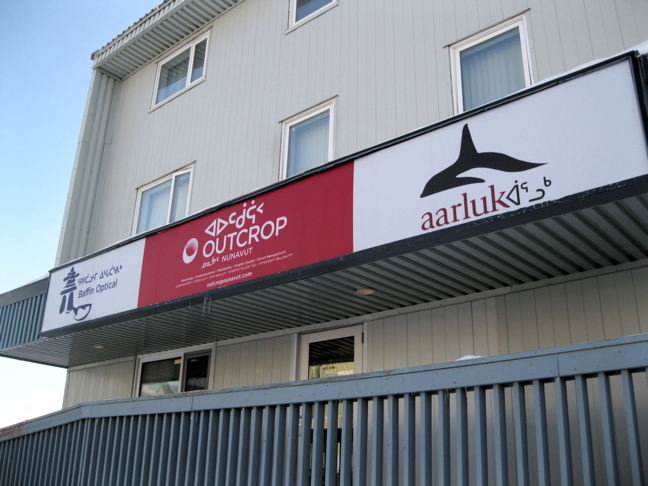Inuit language law now in force for Nunavut’s private businesses
As sections of the Government of Nunavut’s Inuktut-language laws that apply to private businesses come into force across the territory, Nunavummiut should hear more Inuktut greetings and see new and prominent Inuit-language signage.
After years of delay, sections 3 and 5 of the Inuit Language Protection Act and section 12 of the Official Languages Act were brought into force July 9, affecting all private businesses and organizations serving Nunavummiut, ranging from hotels and retail stores to daycare centers.

Nunavut MLAs passed the legislation in 2008, but the sections that affect to private businesses were delayed for years to give private businesses and organizations time to prepare.
The Inuit Language Protection Act has been in force for the Government of Nunavut since 2011.
The new standards require posted Inuktut text to be at least equally prominent with other languages and an “active offer” of services in spoken Inuktut.
“As a general rule, the text should be displayed so that Inuktut is likely to be read first,” said an information sheet on best practices recently sent out to private entities by the GN’s Department of Culture and Heritage.
This includes posters displayed on premises, flyers or brochures, promotional materials, newspaper, radio, television and even social media advertisements.
Reception services must also be made available in Inuktut, the department said.
“Consider hiring someone with Inuktut abilities, or take advantage of language training for members of your organization, or teaching them basic greetings words to reception staff,” the department suggested in an information sheet.
Although the policy went into force last month, government officials acknowledge it will take time for private organizations to comply.
As such, Nunavut’s Office of the Languages Commissioner, which is tasked with enforcing language laws, has yet to start issuing fines for bodies that haven’t yet met the new requirements.
“We’re expecting that the implementation process will most likely not happen immediately, but we’ve been receiving requests for more information on how to comply with language requirements,” said Constance Merkosak, acting director at the GN’s Department of Culture and Heritage.
The GN has said it will invest $5 million over the five years to help organizations get up to speed.
That department is developing an education campaign for small businesses in Nunavut and has launched a program that will provide $5,000 grants to help private sector bodies cover expenses like updating signage, translation and proofreading costs and language training courses for employees.
In the meantime, the Office of the Language Commissioner is offering organization language templates and guidelines on how to update their communications.
And finally, the Office of the Language Authority, Inuit Uqausinginnik Taiguusiliuqtiit, responsible for standardizing Inuktut in Nunavut, is available to review terminology and orthography for signage and other documents.
If communications are directed to all Nunavummiut, these should include both Inuinnaqtun and Inuktitut. A private organization that operates locally in Kugluktuk or Cambridge Bay would ensure Inuinnaqtun is prominent, the GN said.